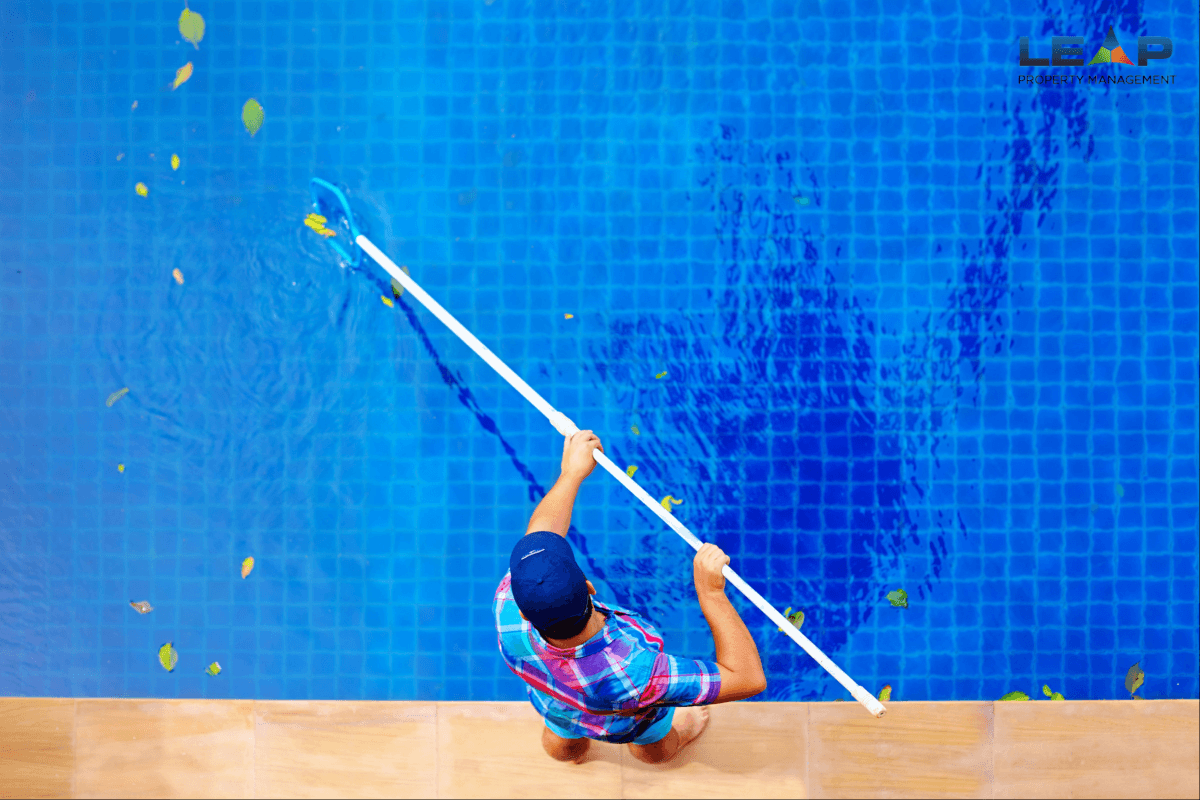
Ahh, summer. It’s the perfect time for getting outside, enjoying the sunshine, and — depending on your property — taking a dip in the pool.
Having a rental house with a pool can be a major asset in the heat of Texas summers. Not only can they add some serious value to a property (and demand higher rents), but pools are great for marketing; when potential tenants see a pool, they picture long days spent poolside — and it can be just what you need to sell them on the property.
But there are definitely downsides to purchasing and renting a house with a pool. First off, the maintenance can be a challenge. Heat (like the heat we experience during Texas summers) causes water levels to drop — which means you have to work to keep your pool full. Also, tenants typically aren’t familiar with how to take care of a pool, which means they could potentially cause damage or reverse any progress you’ve made in keeping your pool in working order (for example, letting the water level get below the pump — and burning it out in the process).
There are also the liability issues to think about. There’s no way around it — pools can be dangerous. You MUST have a lock on the gate to your pool, but even with a lock, accidents can happen. From 2005-2014, there were an average of 3,536 fatal unintentional drownings in the US — and one in five people who die from unintentional drownings are children under the age of 14. Drowning is a HUGE liability to owning a rental house with a pool — and because of that, when looking for properties for investors, we generally filter out rentals with pools; the potential risks just outweigh the rewards.
But if you’re set on buying an investment property with a pool — or you already own a property with a pool — there are definitely ways to make the experience a positive (and safe!) one. Here is the property owner’s guide to renting a house with a pool:
Tackling Maintenance Issues
The first thing you’ll want to stay on top of when you own a rental house with a pool is maintenance. Pool maintenance issues can quickly spiral out of control, leaving you with a wet, expensive mess — so it’s important to stay on top of maintenance from day one.
Here are some tips to make sure you keep your pool clean, well maintained, and in working order through the summer (and beyond):
Hire Weekly Help
The key to maintaining your pool? Regular maintenance.
While property managers can handle most maintenance issues, you’re definitely going to want to hire a specific pool vendor to manage pool maintenance. Hire a pool vendor to visit your property on a weekly basis, check on the pool, perform necessary maintenance, and keep you in the loop with thorough notes and photos. By having a vendor come in weekly to check on the pool, you’ll catch any issues early before they get out of hand (and unreasonably expensive).
Hiring a pool vendor to manage your pool is crucial to protecting your investment — you need someone who knows the ins-and-outs of taking care of pools, which isn’t likely to be the case with a property management company (in fact, at LEAP, we won’t manage a property with a pool unless the investor already has a pool service in place).
Get Tenants Up to Speed on Basic Upkeep
It’s your pool vendor’s responsibility to perform maintenance on the pool — but it’s your tenant’s responsibility to keep it in working order on a daily basis. When you want to rent to a tenant, make sure you get them up to speed on basic pool care and upkeep before they sign a lease. If you’re not sure they can or will take care of the pool, don’t rent to them.
Tackling Liability Issues
Now that we’ve talked about managing maintenance, let’s talk about the other side of the coin: liability issues.
While you obviously need to put basic safeguards into place to protect your tenants (like a lock on the pool gate), when you’re renting a house with a pool, it’s also crucial you take the steps to protect yourself.
Adding a pool addendum to your lease agreement protects you in the unfortunate event that a tenant or tenant guest injure themselves in or around the pool. The pool addendum reads as follows: “Tenant assumes all risk when Tenant or Tenant's guests use the pool or spa. Landlord and Landlord's agent are not liable for use of the pool or spa by Tenant or Tenant's guests.”
Adding that one line of text to your lease agreement is essential if you want to avoid potential liability issues related to the pool at your rental property.
If you want an extra layer of security in addition to the pool addendum, talk to your insurance rep about increasing your homeowners’ insurance (many investors with a pool at their rental property go from $100K of coverage to $500K, which adds an additional $50 to $75 a month to their premium).
Wrapping Things Up
If you already own a rental house with a pool, these tips will help ensure that the pool is a value add — and not a drain on your investment. If you’re considering purchasing and renting a house with a pool, make sure to take the time to do a cost/benefit analysis and weigh the value add against the additional costs and potential issues. Only you can decide if a pool is right for you and your investment — and if it is, you now have everything you need to dive in.


